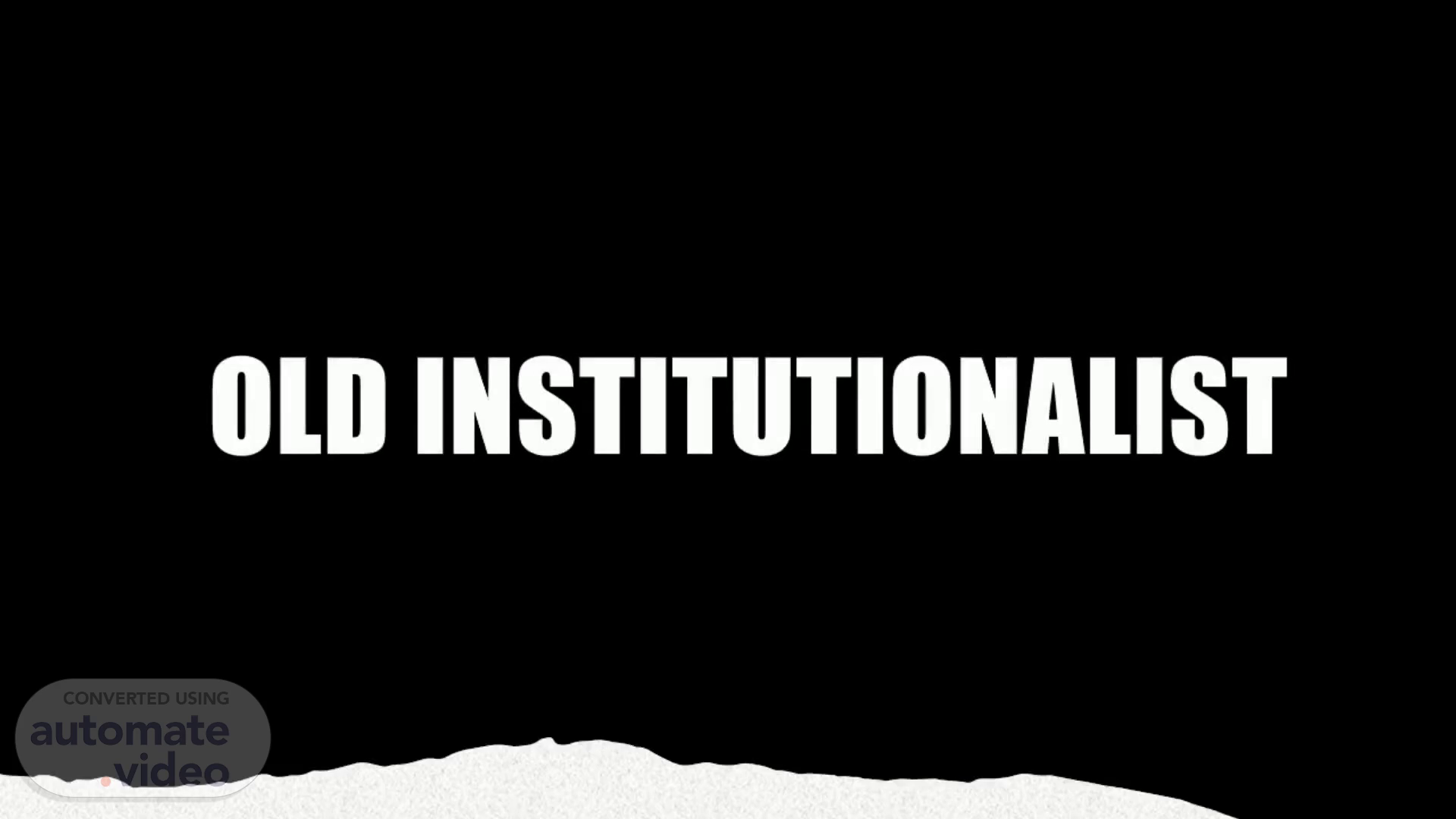
OLD INSTITUTIONALIST
Scene 1 (0s)
OLD INSTITUTIONALIST.
Scene 2 (3s)
INTRODUCTION. Institutionalism has been a very important approach within Political Science for decades. Outside of Political Theory, the core activity within Political Science was the description of: CONSTITUTIONS LEGAL SYSTEMS GOVERNMENT STRUCTURES AND THEIR COMPARISON OVER TIME AND ACROSS COUNTRIES.
Scene 3 (22s)
INTRODUCTION. Rational choice model also in the 1960s and 1970s explained politics in terms of the interplay of individual's self interest The major contention of rational choice theorists is that when faced with several courses of action, people usually do what they believe is likely to have the best overall effect..
Scene 4 (50s)
INTRODUCTION. By the 1980s, institutionalism emerged with more potency and rigor. Institutionalism is now used to examine systems ranging from micro interpersonal interactions to macro global frameworks..
Scene 5 (1m 2s)
TRADITIONAL INSTITUTIONAL APPROACH. Deals with the deeper and more resilient aspect of social structure It considers the processes by which structures, including schemas, rules and norms and routines become established as authoritative guidelines for social behavior. Institutions are regular, stable and recurring patterns of behavior. Institutionalism is an approach to the study of political institutions, a set of theoretical ideas and hypothesis concerning relations between institutional characteristics and political agency, performance and change. It is considered the "historic heart" of Political Science and part of the toolkit of every political scientist. It covers the rules, procedures, and formal organization of government..
Scene 6 (1m 30s)
TRADITIONAL INSTITUTIONAL APPROACH. FEATURES: Legalism. Deals with the dominant rule of law in governance. Law constitute both the framework of the public sector itself and major way by which the government can affect the behavior of people. Structuralism. The contention here is that structure not only mattered but also determined behavior. It concentrated on the major institutional features of political systems and undertook comparative analysis of different political systems. Holism. It was also concerned with constitutions and formal structures. Normative. Political Science emerged from normative roots and so traditional institutionalists linked their descriptive analysis of politics with the concern for "good government"..
Scene 7 (1m 55s)
TRADITIONAL INSTITUTIONAL APPROACH. CRITICISMS: The over reliance on structure by old institutionalists leave very little room for the impacts of individuals, which is not good enough. The concentration of old institutionalists on whole systems as basis of comparison made generalization and theory building too difficult. The concentration of traditional institutionalists on normative analysis undermines the subject matter of political science. The institutionalists concern with norms and values meant that this work could not be scientific. The focus on formal government institutions, constitutional issues and public law was unpalatably formalistic and old-fashion. It was insensitive to the non-political determinants of political behavior and hence to the non-political bases of governmental institutions.
Scene 8 (2m 19s)
NORMATIVE INSTITUTIONAL. Advance by March and Olsen. They posit that the best way to understand political behavior at both the individual and collective levels is through the "logic of appropriateness" that individuals acquire through their membership of institutions. People functioning within institutions behave as they do because of normative standards rather than because of their desire to maximize individual taste and preference. Normative institutionalism reflects the important role assigned to norms and values within an organizatIon in explaining behavior of actors..
Scene 9 (2m 41s)
HISTORICAL INSTITUTIONALISM. This approach is associated with the writings of Steinmo,Thelen and Longstreth. The proponents of historical institutionalism built on the old tradition of political science that assigned importance to formal political institutions. The argument of this approach is that the policy and structural chioces made at the inception of the institution will have a presistent influence over its behavior for the remainder of its existence. The basic explanatory principle of historical institutionalism is "path dependancy ".
Scene 10 (3m 4s)
HISTORICAL INSTITUTIONALISM. It is concerned about the persistence of organization after they are formed. It argues for the historical analysis of institutions by adapting the concept of path dependency. Institutions are regarded as somewhat stable and and rigid for reforms and environmental changes. Ranges from the rules of a constitutional order of the standard operating procedures of a bureaucracy to the conventions governing trade union behavior. It argues for the historical analysis of institutions by adapting the concept of path dependency..
Scene 11 (3m 30s)
RATIONAL CHOICE INSTITUTIONALISM. Rational choice of institutionalism emerged from the study on the congress in the United States. It sought to explain the unusual stability associated with congressional outcomes. The basic tenet of rational choice institutionalism is that institutions are arrangements of rules and incentives, and that members of the institutions behave in response to those basic components of institutional structures. The goal of rational choice institutionalism is to uncover the laws of political behavior and action. In recent years RCIs have tuned their attention to a variety of other phenomena, including;.
Scene 12 (3m 54s)
RATIONAL CHOICE INSTITUTIONALISM. Cross-national coalition behavior The development of political institutions The intensity of ethnic conflict. Rational choice institutionalism is used to explain; The rise or fall of international regimes The kind of responsibilities that states deligate to international organizations The shapes of such organizations.
Scene 13 (4m 8s)
INTERNAL DEBATES OF RCI. Like other theories, rational choice institutionalism contains some internal debates. It relies extensively on a set of behavioral assumptions. Individuals behave in highly instrumental manner. Rational choice institutionalists tend to see politics as a series of collective action dilemma. Ex. Include, 'prisoners dilemma' The ' tradgedy of commons' It emphasizes the role of strategic interaction in the determination of political outcomes..
Scene 14 (4m 27s)
INTERNATIONAL DEBATES OF RIC. It explains how institutions originate and persist over time. The process of institutional creation therefore revolves around voluntary agreement by relevant actors. In a situation where the institution is subject to competitive selection, it survives primarily because the benefits provided to the relevant actors are far more than alternative institutional forms..
Scene 15 (4m 41s)
PRESENTED BY:. SOPHIA NICOLE C. EULOGIO and MARIECAR DIZON (BSBA 1-1 BE).